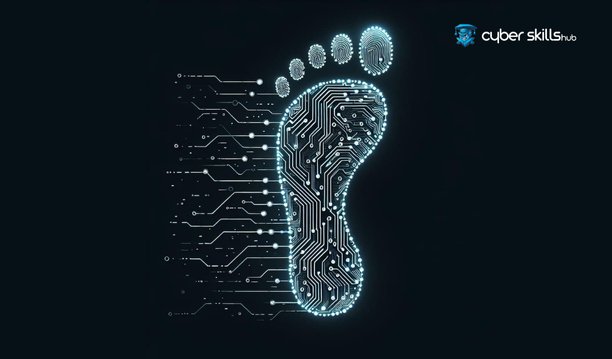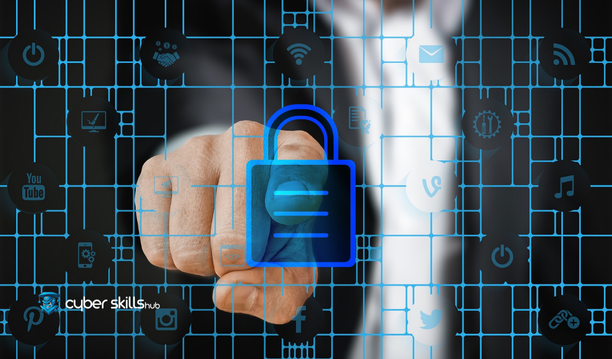Currently Empty: $0.00
Protecting Your Digital Footprints: Free Guide from CyberSkillsHub

As the digital world continues to grow, the protection of personal data is becoming equally important. Each of us performs numerous activities every day, from online shopping to social media sharing, sending emails to visiting websites. So, how well can we protect the digital footprints we leave behind during all these activities?
As CyberSkillsHub, we have compiled some basic steps and strategies to help you exist more securely in the digital world. From your passwords to your social media settings, from updates to advanced security techniques, here are ways to protect your digital footprint:
Use Strong Passwords
- Use a different password for each account: If your passwords are stolen, use a separate password for each account to prevent the damage from spreading to other accounts.
- Choose strong passwords that include a mix of characters, numbers, and letters: It is important to use uppercase letters, lowercase letters, numbers, and symbols to make your password difficult to guess.
Use Two Factor Authentication
- Enable two-factor authentication on your accounts: It provides an extra layer of security and makes it harder to access your account even if your password is stolen.
Do Not Click on Unsafe Links
- Avoid clicking on unsafe links: To prevent malware from infiltrating your system, do not click on links you do not recognize or trust.
Avoid Unsafe Applications
- Avoid apps downloaded from untrusted sources: Only download apps to your device from trusted stores (such as the Google Play Store or Apple App Store). Apps downloaded from untrusted sources may contain viruses or malware.
- Carefully review app permissions: Checking app permissions helps you understand what data they can access. For example, a flashlight app requesting access to your contacts may be suspicious. Make sure permissions are reasonable and consistent with the app’s function.
- Review Ratings and Reviews: Checking other users’ ratings and reviews before downloading the app can help you get an idea of its reliability.

Use Security Software
- Security Software: Smartphones, tablets, and computers contain a lot of personal and sensitive information today. Therefore, the security of these devices is of great importance to users. Here are the important aspects of using security software:
- Application Scan: Security software can scan applications installed on your device to detect potential threats. This can help prevent malware from infiltrating your device.
- Real-Time Protection: Many security software programs offer real-time scanning, so they can block threats even during the download process.
- Web Security: Security software can provide protection against dangerous and fake websites, thereby preventing phishing attacks and other online threats.
- Protection Against Device Theft: Some security software offers features that allow you to remotely lock, wipe, or locate your device if it is stolen or lost.
- Privacy Controls: Allows users to manage which apps have which permissions, giving you more control over your personal data.
- Regular Updates: Security software is constantly updated, so you get the latest protection against new threats.
Follow the Updates
- Install the latest security updates: Updates fix known security vulnerabilities, so make sure your operating system, browser, and applications are up to date.
Enhance Browser Security
- Secure browser extensions and settings: You can enhance your browser security by using extensions such as AdBlock and HTTPS Everywhere, as well as secure search engines.
Use a VPN
- Use a VPN when connecting to unsecured Wi-Fi networks: A VPN encrypts your internet traffic, preventing your connection from being monitored or intercepted over unsecured networks.

Review Your Social Media Settings
- Adjust your social media privacy settings: Controlling who can see your profile protects your personal information from strangers.
Protecting Against Phishing Attacks
- Recognizing phishing emails and websites: Not opening emails from untrusted sources and carefully checking URLs can help protect you from phishing attacks.
Understand the Connection Between Offline and Online Privacy
- The relationship between physical security and digital security: Physical security involves the protection of personal information and property, while digital security involves the protection of online information. The two are interrelated because a digital attack can also compromise physical security.
- Protecting personal information online: Be careful when sharing your personal information, make sure reliable sites have SSL certificates, and use strong passwords.
Tracking Digital Footprints
- Tracking and controlling digital footprints: Methods such as regularly clearing cookies, using a VPN, and browsing in incognito mode can help keep your digital footprint under control.
Safety for Children and Young People
- Online safety for children and young people: Parents and teachers can ensure children and young people have access to safe content and educate them about online safety.
Advanced Security Techniques
- Techniques for protecting your digital footprint: For advanced users, tools such as the Tor Browser, multi-factor authentication, and specialized operating systems can enhance digital privacy.
Conclusion
Protecting your digital footprint is one of the cornerstones of staying safe in the online world. From strong passwords to using a VPN, avoiding unsafe connections to ensuring online safety for children and young people, we hope you find this guide useful. For more information and training, don’t hesitate to explore the cybersecurity training offered by CyberSkillsHub.
Click for Various Cybersecurity Training Courses
Staying safe in the online world is possible with the right information and education. If you want to become an expert in this field, join the CyberSkillsHub platform and learn how to stay safe in the digital world! 🛡️
Frequently Asked Questions About Digital Footprints
What is a digital footprint?
A digital footprint is the data trail you leave behind as a result of your online activities. Your online activities create these traces, which can be tracked.
How to create a strong password?
A strong password should contain uppercase letters, lowercase letters, numbers, and special characters. Using different passwords for each account increases your security.
What is two-factor authentication and why is it important?
Two-factor authentication requires two separate verification methods to access your account. This ensures account security even if your password is stolen.
What are the benefits of using a VPN?
A VPN encrypts your internet connection and enhances your online privacy. It protects you from data theft, especially when connecting to unsecured Wi-Fi networks.
What can be done for children’s online safety?
Parents and teachers should ensure children have access to safe content and educate them about online threats. It is important to actively use child safety settings.
Why is cybersecurity software important?
Cybersecurity software blocks malware, protects your device in real time, and helps you take action by detecting potential threats.
How can you recognize unsafe links?
Unsecure links usually come from unfamiliar sources and have suspicious URL structures. Sites that do not use the HTTPS protocol may be unsafe.
How can you protect yourself from phishing attacks?
To protect yourself from phishing attacks, you should not open emails from untrusted sources and carefully check the URL for every link you click.







